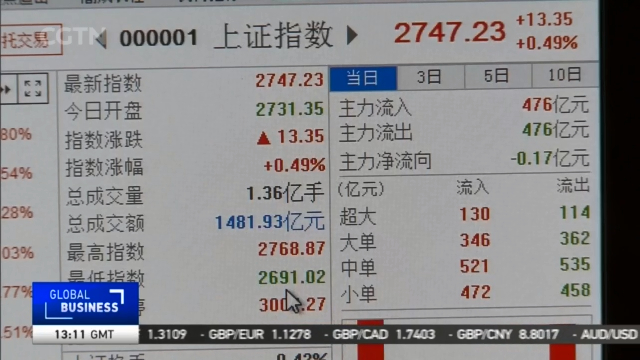
22:09, 06-Jul-2018
China-US Trade Frictions: Markets steady after trade escalation
Updated
21:22, 09-Jul-2018
02:11

The equity markets here in China rebounded after China placed counter-tariffs on US goods. The Chinese RMB also steadied despite those US tariffs. Chen Tong takes a closer look.
While it's been on a continual slide during recent weeks, the value of the onshore Renminbi against the US dollar weakened just a bit during morning trade today, but then picked up after the tariffs were imposed at noon.
Experts are saying the value of the Chinese currency should hold around the current level, given that its recent declines have most likely priced in the impacts of the new tariffs.
SHAO YU, CHIEF ECONOMIST ORIENT SECURITIES "The Renminbi had already weakened by five percent before the tariffs took effect, and the weakening yuan has made Chinese export more competitive. I think the corrections have already reached expectations, so I don't think the Renminbi will continue to depreciate. The Renminbi's future performance will depend on the seriousness of the trade disputes."
The minutes of the June Federal Reserve meeting released in Washington yesterday further emphasized the confidence of US policy makers in a campaign of gradual interest-rate increases, which argues against a strengthening dollar. The dollar index declined slightly today. Affected by all this, of course, the A-share market also rebounded after the tariffs were imposed, but experts believe the recovery is just temporary and that it will be difficult for the index to regain the 3,000-point level in the short term.
YANG ZHONGNING, INVESTMENT CONSULTANT INDUSTRIAL SECURITIES "I think the rebound today was just a reaction to the confirmation of the tariffs. The current stock market is quite complicated because it has never really seen anything like this before. This is just a short-term recovery. The index would need to recover ten percent to reach 3,000 points, and it's hard to envision a rise like that in the short term."
The market's declines may slow, however. Money market liquidity will pick up in July, as the central bank has cut the reserve requirement ratio for commercial banks and broadened the range of collateral it accepts in its medium term lending operations. Experts believe the impact of this will be to ease the decline in the markets.

SITEMAP
Copyright © 2018 CGTN. Beijing ICP prepared NO.16065310-3
Copyright © 2018 CGTN. Beijing ICP prepared NO.16065310-3